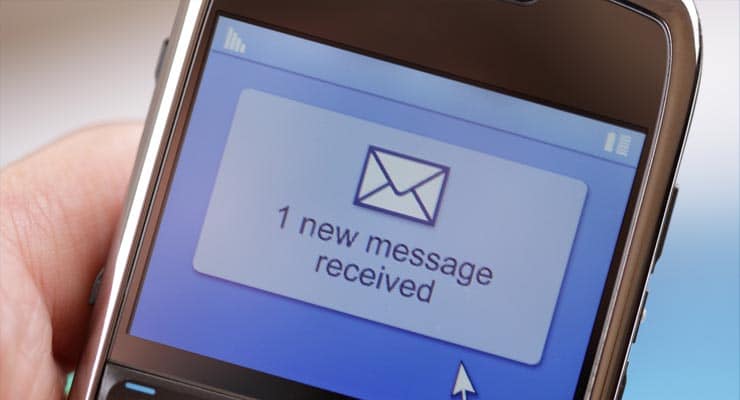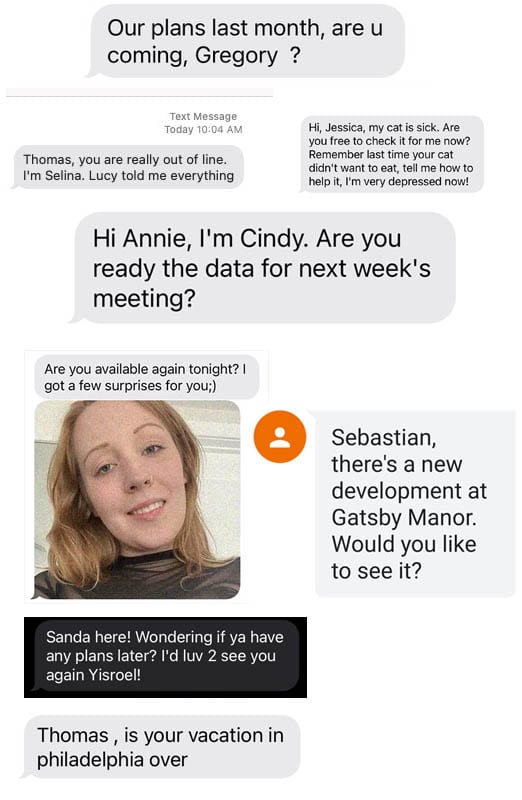Beware of “wrong number” text message scams
Recipients should be aware of unexpected SMS texts that appear to have been sent to them by mistake, especially if the sender of that text appears to try and continue a conversation once the recipient points out the mistake.
We’ve been warning for a while about “mistaken identity dating” scams whereby a recipient receives a flirtatious message apparently sent to them by mistake, only for the flirty sender to the attempt to strike up a conversation with the recipient.
The same ilk of scammers have since broadened their horizons and a wave of different “wrong number” text scams have been proliferating across phones around the world.
In each case a recipient will receive an unexpected text message, often calling them by a seemingly random name. We’ve listed some examples below.
Thomas, you are really out of line. I’m Selina. Lucy told me everything.
Our plans last month, are u coming, Gregory?
Hi Annie, I’m Cindy. Are you ready the data for next week’s meeting?
Are you available again tonight? I got a few surprises for you 😉
Sebastian, there’s a new development at Gatsby Manor. Would you like to see it?
Hi, Jessica, my cat is sick. Are you free to check it for me now? Remember last time your cat didn’t want to eat, tell me how to help it, I’m very depressed now!
Thomas, is your vacation in Philadelphia over
Sanda here! Wondering if ya have any plans later? I’d luv 2 see you again Yisroel!
Scammers appear to be using this “wrong number” social engineering technique in order to strike up a conversation with a victim. At some point in that conversation the scammers will attempt to lure the recipient to malicious websites.
Sponsored Content. Continued below...
In some cases these websites are adult content websites. However other types of malicious websites – such as site that harbour malware or websites intent on stealing your personal information – could be the intended destination. Additionally these types of “wrong number” text messages could be used by romance scammers to recruit victims.
Some tips to spot and avoid these scams –
- In nearly all cases, the sender of the message will address the recipient by an incorrect name, either in the initial message or in a follow-up message.
- The sender will appear keen to carry on a conversation despite being told they messaged an incorrect phone number.
- At some point the sender will implore the recipient to click a link or send money.
- The messages from the sender may appear disjointed, contain poor spelling or may not follow the flow of conversation.
If you receive just a message, the best advice is to just block the phone number. Replying to the message – even if you suspect it is a scam – will just confirm your phone number is genuine and active, and that will likely lead to more SMS scams being sent to you.
Continued below...
Thanks for reading, we hope this article helped, but before you leave us for greener pastures, please help us out.
We're hoping to be totally ad-free by 2025 - after all, no one likes online adverts, and all they do is get in the way and slow everything down. But of course we still have fees and costs to pay, so please, please consider becoming a Facebook supporter! It costs only 0.99p (~$1.30) a month (you can stop at any time) and ensures we can still keep posting Cybersecurity themed content to help keep our communities safe and scam-free. You can subscribe here
Remember, we're active on social media - so follow us on Facebook, Bluesky, Instagram and X

